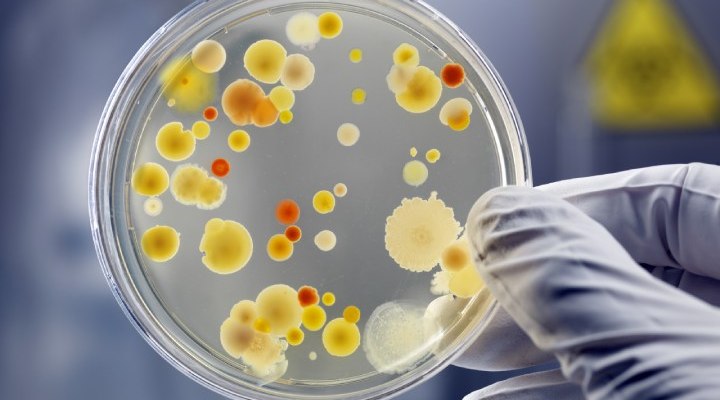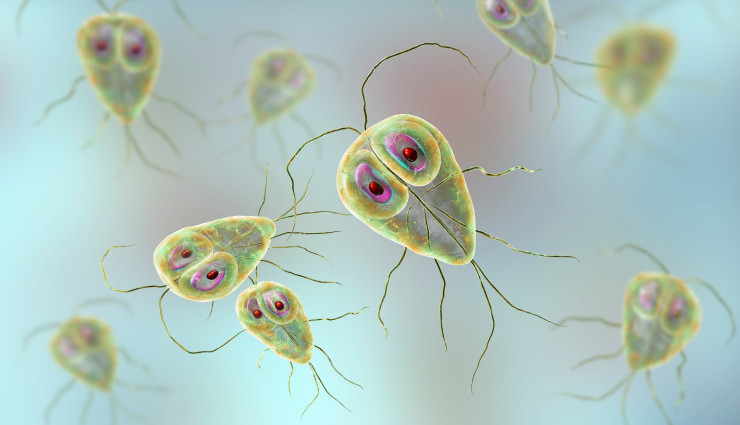Giardia infection (Giardiasis) is a common disease and gastroenteritis caused by a parasite of the same name. This disease is transmitted through water, food, and contaminated surfaces, and the symptoms of this disease (such as diarrhea and stomach cramps) usually appear 7 to 10 days after infection. Do you know the way to diagnose and treat Giardia and prevent it? To learn more about this disease, stay with us until the end of the article.
What is Giardia?
Giardia is a parasite in the intestines of humans and animals such as cows, sheep, cats, dogs, mice, and wild animals and is transmitted through the feces of infected humans and animals. A parasite is an organism that needs another organism (such as a human or an animal) to survive. People get this disease by swallowing parasites, usually through contaminated water. This parasite makes some people very sick.
This parasite can remain in the environment for long, especially in rivers, streams, and rooftop water. If soil, food, water, or surfaces are contaminated with Giardia, you cannot tell by taste, appearance, or smell.
Giardia outbreak
The Giardia parasite lives worldwide, but its prevalence is higher in countries with poor economies and developing countries. However, you can get this disease anywhere.
The mode of spread of Giardia infection
A person becomes infected by swallowing the parasite, usually by drinking contaminated water or touching the mouth with contaminated hands. Once a person or animal is infected with Giardia, the parasite is transmitted through feces. Parasites can infect soil, food, water, or surfaces such as toys, faucets, doorknobs, and diaper-changing tables.
Not all people with Giardia get sick, but they may be carriers and spread the parasite without showing symptoms.
Who is more susceptible to Giardia?
Anyone can be infected with Giardia. However, some factors make the infection more likely, including:
- work in child care centers;
- close contact with a sick person;
- travel to areas with poor sanitation;
- contact with contaminated feces during sexual activity, especially anal intercourse;
- touch of a person with an infected animal or connection of animals with an environment containing contaminated feces;
- weak immune system ;
- I was swimming and swallowing contaminated pool, hot tub, untreated river, snow, or river water.
The possibility of humans contracting Giardia through infected dogs and cats is low. Usually, the type of parasite that infects humans differs from the one that infects dogs and cats.
Symptoms of Giardia infection
This infection is a type of gastroenteritis. Giardia symptoms include:
- diarrhea (prevalent);
- stomach cramps or abdominal pain;
- feeling tired ;
- feeling sick (nausea and vomiting);
- flatulence
Giardia symptoms appear 3 to 25 days (usually 7 to 10 days) after infection with the parasite. You may be sick for 3-4 days, feel better, and then the symptoms return. If Giardia is not treated, it can persist, and you can remain infected for months.
Giardia diagnosis

Most cases of gastroenteritis do not require special investigation. If your symptoms are severe or progressive or your doctor suspects Giardia, you will need a stool sample and a laboratory test for Giardia infection. Also, the doctor may use an upper endoscopy to examine the intestine in severe cases.
Giardia is a notifiable disease; if this disease is diagnosed, your doctor will inform the health centers to investigate the source of the virus.
Giardia treatment
Most people with this disease get better without treatment. Suppose your doctor determines that you need treatment. In that case, you should use prescription antibiotics such as ornidazole, tinidazole, or metronidazole, which kill the parasite in the stool and prevent the infection from spreading. You should also drink plenty of fluids to avoid dehydration, especially if you have diarrhea or nausea. The elderly, pregnant women and children are more prone to dehydration. In children, less wet diapers can be a sign of dehydration.
Diarrhea medications such as loperamide and desktop are not usually recommended. Prolonged diarrhea can put you at risk of severe complications from toxic megacolon. It is also not recommended to use diarrhea medicines for children under 12. Consult your doctor before taking medications.
Many people have a temporary intolerance to milk after contracting Giardia. Therefore, avoiding milk and lactose-containing foods may be better for one month after treatment.
Rest period for recovery
Avoid going to school, kindergarten, or work for 48 hours (2 days) after the symptoms disappear, and avoid swimming in the pool (public or private) for two weeks after the symptoms disappear. However, since Giardia is a knowable issue, it is best to consult a doctor first.
Disease Prevention
The best way to prevent this is to maintain proper hygiene and take some measures, including:
- Wash your hands regularly, especially after going to the bathroom, handling animals, changing diapers, and eating and drinking.
- Clean and disinfect toys and surfaces.
- Do not swallow water from the pool, river, etc.
- Learn about Giardia infection outbreaks in your park and commuting areas.
- Avoid drinking unboiled tap water and eating uncooked food when traveling to countries with unsafe water.
- Have safe sex.
you say
How familiar are you with Giardia and its symptoms? Have you ever been infected with this parasite? If you wish, you can write us your experience and opinion in the comments section and share this article with your friends through social networks to protect the health of others.
Warning! This article is only for educational purposes; to use it, it is necessary to consult a doctor or specialist.



